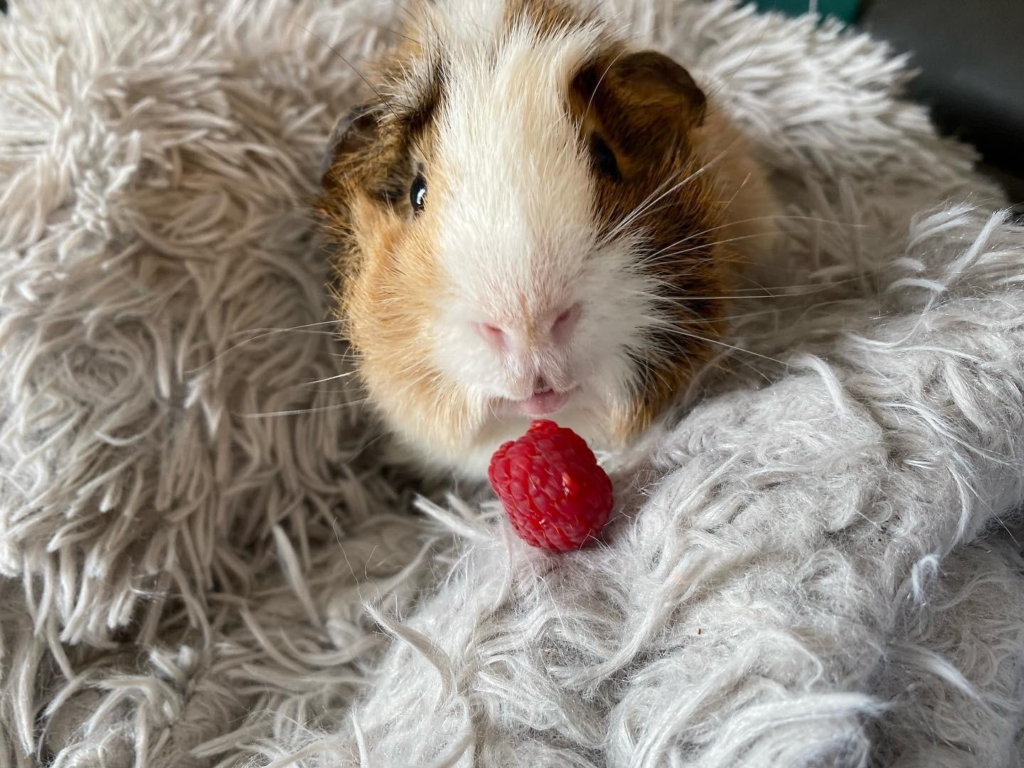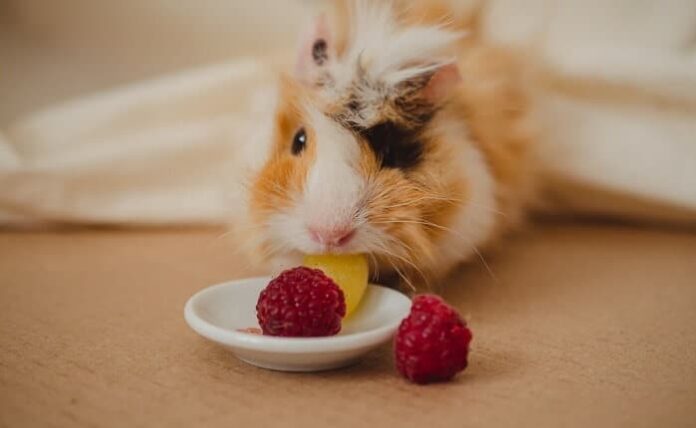Last Updated on December 12, 2023 by Fumipets
Can Guinea Pigs Eat Raspberries?
Guinea pigs will gladly consume practically everything that you offer them, particularly fresh produce. They may benefit greatly from certain human diets while possibly suffering negative effects from others.
What about the crimson jewel of fruits, raspberries? What about raspberries for guinea pigs? Guinea pigs can indeed consume raspberries.
In this post, we examine the nutritional advantages, potential hazards, and feeding instructions for your guinea pig when it comes to eating raspberries.
Can Guinea Pigs Eat Raspberries?
A great dietary guideline for any animal you keep as a pet is to feed it as closely as you can to what it would eat in the wild. The natural diet of a guinea pig consists of fruits, vegetables, fresh grass, hay, and herbs. Raspberries may so readily be included into their regular diet.
Consider the chance that the snacks you feed your guinea pig may be found in the wild. Around the world, raspberries are widely grown. That implies that there is a decent chance they can locate them while scavenging.
Nutritional Benefits of Raspberries for Guinea Pigs
Raspberries are not only edible to guinea pigs, but they also provide a wealth of nutritional advantages.
Because they are prone to obesity, guinea pigs benefit greatly from raspberries’ reduced fat content. If their name doesn’t already allude to their propensity for overeating, you as the new owner will rapidly learn it. Treats with a lot of fat should be kept to a minimum.
The high concentration of antioxidants in raspberries is another benefit for guinea pigs. Vitamins B6, E, C, A, and K are included in them. To some extent, guinea pigs need each of these. Guinea pigs get antioxidants and immune system bolsters by eating a few raspberries a few times a week.

Risks Associated with Giving Your Guinea Pig Raspberries
Although raspberries have several health advantages, guinea pigs may experience hazards if they consume too many of them.
Xylitol
Not all fruits’ sweet flavors come from the same ingredients. The sweet taste of raspberries is due to a substance called xylitol. Many animals are adversely affected by xylitol. Although it does happen naturally, we can also make it synthetically to replace sugar.
The xylitol substance enters a guinea pig’s circulation swiftly and triggers the release of insulin, which may cause the blood sugar to plummet suddenly. Hypoglycemia may happen if you consume too many raspberries too regularly.
To xylitol, some guinea pigs are even more sensitive than others. It is recommended to start off by giving your guinea pig a very little piece of raspberries if you decide to give them some as a treat. After then, wait a few hours to make sure they don’t have a negative response to it.
Calcium
Calcium levels are high in raspberries. Although this makes them beneficial to humans, it is not advantageous to guinea pigs. Actually, it becomes a serious health danger for them. The quantity of calcium required decreases as they become older.
A guinea pig’s urinary problems may result from consuming too much calcium in its diet. This includes causing kidney and urinary tract infections, blood in the urine, and the formation of kidney and urinary tract stones.
Fiber
Too much fiber in raspberries might cause digestive problems. Guinea pigs may get an unpleasant upset stomach if they consume too much fiber. This might indicate gas, discomfort, cramps, or even loose stools.
After giving your guinea pig raspberries, keep an eye out for any of these signs during the next several days. Limit or eliminate raspberries from your diet if you experience any unfavorable effects.
How to Feed Your Guinea Pig Raspberries
Despite the fact that guinea pigs can eat raspberries, they shouldn’t do so often. You need to restrict how much raspberries they consume. Raspberries shouldn’t be given to guinea pigs every day. To provide them a varied diet, it is preferable to feed them various fruits throughout the week.
Raspberries should only be given to guinea pigs twice a week as a reward. One or two raspberries should be all that is included in each serving. If they consume any more than this, they risk harming their health.

Other Fruits That Guinea Pigs Can Eat
If you want to provide your guinea pig a variety diet, there are many different fruits you may feed them. It might be enjoyable to sometimes be able to pamper them. Throughout the week, you may also give your guinea pig the following fruits:
Blueberries
Nectarines
Strawberries
Melons
Kiwi
Pineapple
Mango
Bananas
Fresh hay and green vegetables should make up the majority of a guinea pig’s diet. Offer them snacks sporadically only. No more than 10% of a guinea pig’s diet should consist of treats.
Conclusion
You may give your guinea pig raspberries. To maintain them secure and healthy, you should only provide them a few times every week. Give them one new treat at a time and observe them closely over the next several weeks for any negative side effects.


















